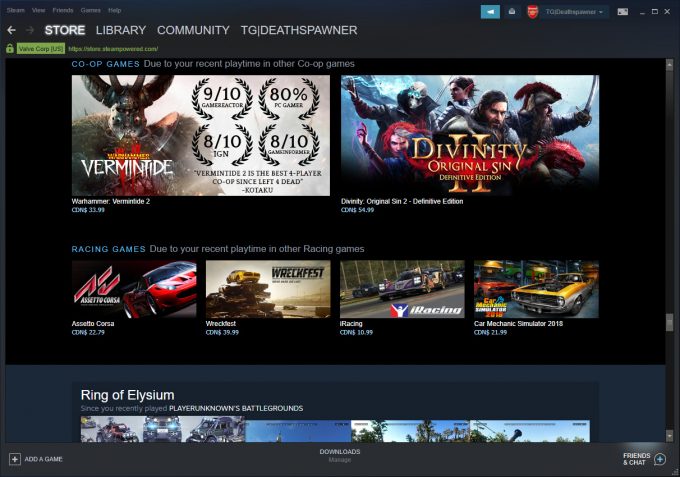

From a commercial point of view it makes sense that Steam would show me this game because I might buy it to be part of the conversation.

In terms of the user reviews and top seller stuff it makes sense that a game getting positive coverage and which is proving to be popular across a wider audience might override those concerns even if it was registering them in some way. The system doesn't seem to take into account those relative weightings or that I have no interest in other games on the BioShock side of the equation. Conversely I have 67 hours in No Man's Sky. I have 0.1 hours in Bioshock 2 and it was because I was taking a couple of screenshots for an apartment feature in multiplayer mode not in the main game.

Steam picked this because it's similar to Bioshock 2 and No Man's Sky, the user reviews are generally Very Positive, it's in the top sellers, 21 friends own it and 5 friends want it. The space station has been overrun by hostile aliens and you are now being hunted. You are the key subject of an experiment meant to alter humanity forever – but things have gone terribly wrong. In Prey, you awaken aboard Talos I, a space station orbiting the moon in the year 2032. I've run through the first few in my list to see what its current hit rate is like and the results are as follows: Prey But now when you click through to those games it goes into a bit more detail. Recommended games already had a snippet which said that I was getting a game in this feed because it shared tags with other games I'd played. Robin Walker notes "We want to show you more of what it's doing and why - and we have some features planned to help with this, starting with one we're launching today: an algorithm section on game pages that states why the Store thinks this game will (or will not) be interesting to you." The most recent entry zeroes in on how the store itself works and aims to share the "thinking" the system has used to come up with game recommendations: Presumably there's an element of using that understanding to defuse criticism when it comes to subjects like the terrible reputation of Steam's support system and whether it's warranted if you add in some more data. There are multiple blog entries which try to open up particularly opaque bits of the company so users can understand what's going on. The people working on Steam (and more generally, the team at Valve) seem to be on a transparency kick at the moment.


 0 kommentar(er)
0 kommentar(er)
